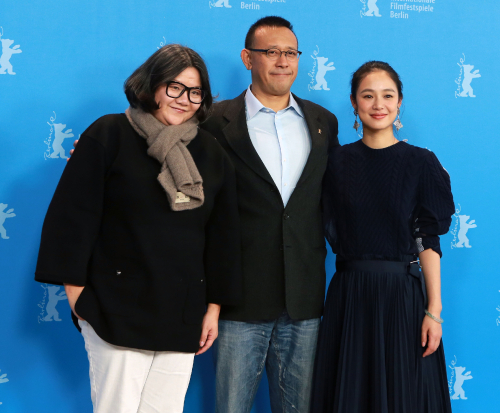 |
|
BERLIN DEBUT: Director Jiang Wen (center) poses with actresses in Gone With the Bullets at the Berlin International Film Festival on February 11 (LUO HUANHUAN) |
It was hard to go anywhere in Beijing in December 2014 without being assailed by posters advertising Chinese auteur Jiang Wen's latest movie Gone With the Bullets. I was drawn to the film's beautiful promotional material showing Jiang's character with one of the film's female leads adversarially juxtaposed against Ge You's character and another female character. I was also taken with the title, blending associations of a rip-roaring old-fashioned romantic epic, interspersed with frequent bouts of gunfire.
Advance word on the movie was good internationally, and the film's opulent promotional campaign whetted appetites on the home front. It carried an enormous budget of 300 million yuan ($48.8 million). Jiang's previous movie Let the Bullets Fly (2010) had broken box office records for domestic releases in China. His body of work, including Devils on the Doorstep (2000) and The Sun Also Rises (2007), is held in high esteem worldwide. Jiang appeared to be one of those rare directors who could straddle the realms of commercial success and artistic excellence without having to compromise on either. All in all, Gone With the Bullets looked like a surefire success.
Fast forward to mid-January, and a different story emerged. Although it performed well on its opening weekend, Gone With the Bullets had failed to match up to the stellar expectations preceding it, not just in terms of box office receipts. International press reports stated the response from both professional critics and audiences in China had been vicious. Reading through some of the feedback second hand, it struck me that some of the comments were curiously touched by hurt or betrayal, as if filmgoers felt hoodwinked into seeing a film far removed from what was advertised. Audience members did not merely dislike the film; they were horrified by it. Naturally, this only piqued my interest further.
An experimental approach
Unfortunately, for review purposes, an English-subbed version of the movie was unavailable. Given the criticism of the film for its experimental indulgence, I therefore reasoned that it might be appropriate in this instance to attempt the correspondingly gonzo exercise of reviewing the movie with no subtitles. Doing so, I thought, would enable me to see how intuitively comprehensible the film's narrative line was. Besides, if reviews by some Chinese netizens were anything to go by, even native proficiency in Mandarin provided no especial advantage in understanding the film's plot.
Going in, I purposefully avoided further reading of reviews or synopses, wishing to ensure that my response to China's "Most Disappointing Film of 2014" would be as untouched by preconception as possible. I knew only a few details: that the movie was a spiritual sequel to Let the Bullets Fly, and that like that movie, it was set during the warlord era in the early 20th century but switched location from Sichuan Province to Shanghai.
In preparation, I also reasoned I could watch Jiang's previous film. I loved it: an intensely likeable and lively Oriental Western, with a wonderfully hammy performance by Hong Kong actor Chow Yun-fat as the movie's villain set against the straight man foil of Jiang's bandit king. The movie's dialogue was superb and the comic timing, delivery and facial expressions of Ge, whom I now believe to be an actor from the cinema's silent era somehow stranded in the present, made me laugh out loud.
If I had one gripe, it was that some of the characters whose deaths were supposed to resonate in the finale were not sufficiently developed, robbing the film of some of its emotional and thematic impact. At 132 minutes, the film also somewhat outstayed its welcome in terms of running time, though its irrepressible charm and energy just about sustained the viewer's interest.
False advertising
I went into my first viewing of Jiang's new foray into the playground of history with some trepidation. The movie's opening reminded me of that of American director Quentin Tarantino's Inglourious Basterds (2009), in that it consists of a largely unbroken monologue powerfully delivered by actor Wen Zhang, with the camera gradually zooming out to reveal the rear of the shoulder and the head of the other participant in the conversation, a powerful framing device as the other party's facial expressions remain unseen to the viewer and have to be inferred from the actor facing the camera, maximizing tension. The presence of tuxedos with poppies pinned to lapels, cigar smoking and the stroking of a white rabbit in obvious homage to The Godfather conformed to my expectation that this was to be a gangster film.
